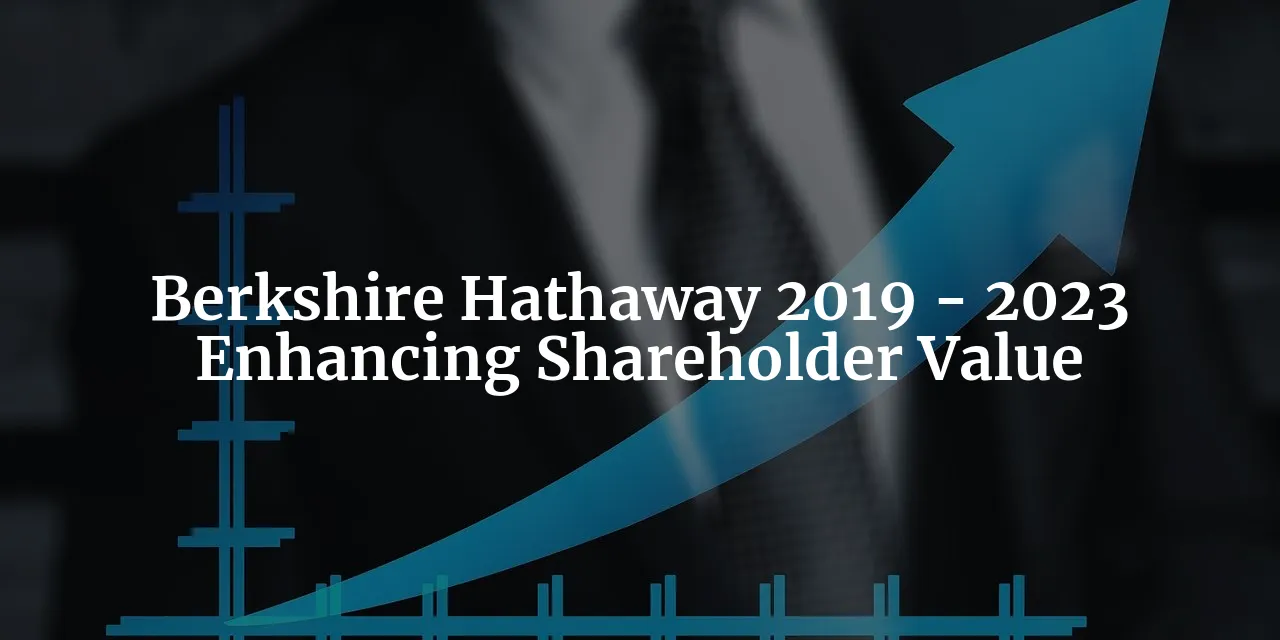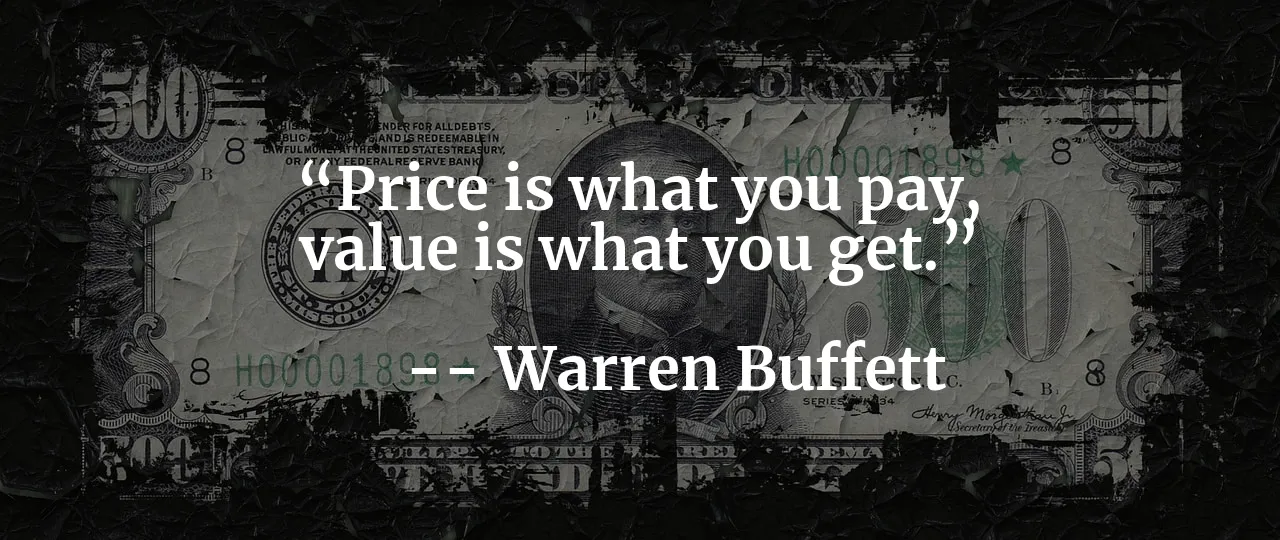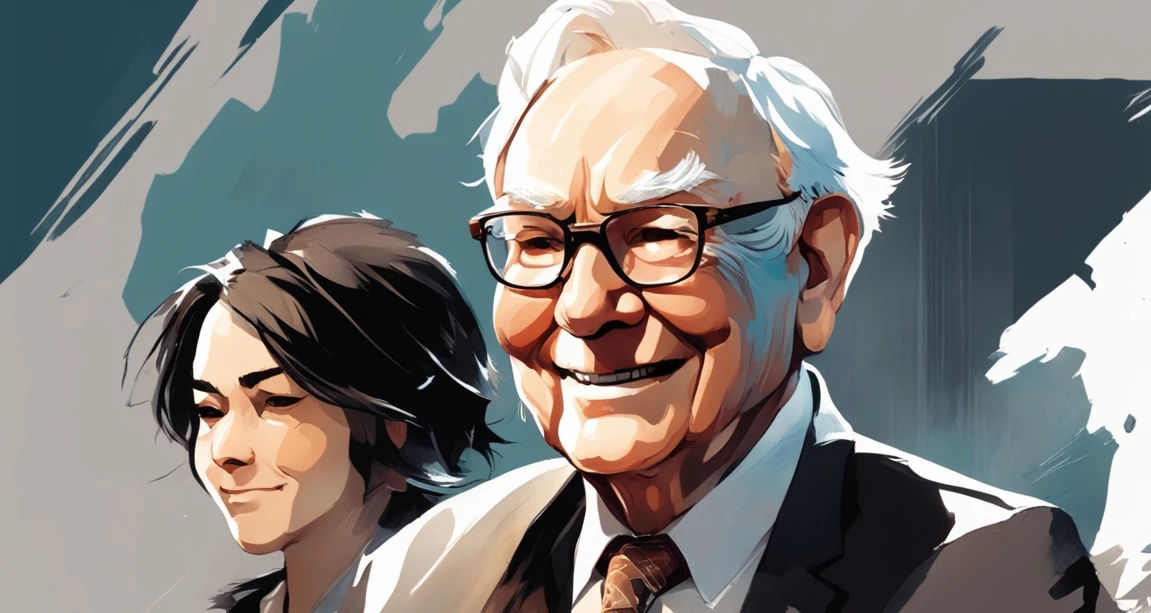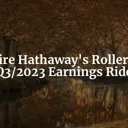Tags: Share Buyback / History
This fanpage is not officially affiliated with Berkshire Hathaway: Disclaimer
Dive into the financial journey of this global powerhouse from 2019 to 2023. Discover the strategic acumen, operational efficiency, and disciplined investment philosophy that have shaped its success. Explore the impact of stock buybacks on per-share book value, and investor perspectives on the company's trajectory.

Introduction
Berkshire Hathaway, a name synonymous with enduring success in the financial world, traces its origins back to 1839 as a humble textile manufacturer. Its transformation into a global conglomerate powerhouse began in 1965, under the astute leadership of Warren Buffett, marking a pivotal shift in its trajectory. This transformation was not just in its business operations but also in its valuation and strategic financial decisions. The question of whether Berkshire Hathaway was undervalued between 2019 and 2023 sets the stage for a deep dive into its financial health, stock performance, and strategic decisions, particularly in the context of shareholder value.
Understanding shareholder value is crucial in assessing a company's valuation. One of the strategies that Berkshire Hathaway employed to enhance this value was through stock buybacks, a method believed by Buffett to significantly impact the perceived value of the company. This article promises a blend of historical, economic, and financial analysis, aimed not just at shareholders but anyone intrigued by Berkshire Hathaway's journey. The significant increase in book value per share and total shareholder equity from 2019 to 2023 serves as a teaser of the comprehensive analysis that follows, highlighting the company's robust financial health and strategic acumen 12.
Enhancing Shareholder Value 2019-2023
Berkshire Hathaway's financial journey from 2019 to 2023 is a testament to its strategic prowess and operational efficiency. The period saw a reduction in equivalent Class B shares outstanding from 2.45 billion in 2019 to 2.17 billion in 2023, amounting to a reduction of approximately 11% or about 280 million Class B equivalent shares. This strategic reduction through share buybacks played a pivotal role in enhancing shareholder value 1.
| Year | Equivalent Class B Shares Outstanding |
|---|---|
| 2019 | 2.45 billion |
| 2020 | 2.39 billion |
| 2021 | 2.27 billion |
| 2022 | 2.20 billion |
| 2023 | 2.17 billion |
During this period, the book value per Class B share saw an impressive increase from $173 to $259, while total shareholder equity surged from $425 billion to $561 billion. This represents a 50% increase in book value per share and a 32% increase in shareholder equity, underscoring Berkshire Hathaway's ability to significantly grow its intrinsic value 1. Furthermore, the robust increase in book value per share serves as a distinct indicator of the highly effective share buyback program. It may also suggest that Berkshire Hathaway was potentially undervalued, trading below its intrinsic value during the period from 2019 to 2023. It is important to note that when a company can repurchase shares below intrinsic value, the book value per share increases, underscoring the strategic value of the share buyback initiative.
| 2019 | 2023 | Change | |
|---|---|---|---|
| Book Value per Class B Share | $173 | $259 | +50% |
| Total Shareholder Equity | $425 billion | $561 billion | +32% |
The company's operating income growth by 21% in 2023 further demonstrates its operational efficiency and profitability. Additionally, Berkshire Hathaway's strategic financial position was bolstered by a record $167.6 billion in cash and equivalents on its balance sheet by the end of 2023. This liquidity not only provides a cushion against market volatility but also positions the company to capitalize on investment opportunities 2.
A significant aspect of Berkshire Hathaway's strategy was its decision not to buy or sell shares of major holdings like American Express ↗ or Coca-Cola in 2023 ↗↗. This long-term value approach is reflective of Buffett's investment philosophy, emphasizing the importance of patience and confidence in truly wonderful businesses. Both American Express and Coca-Cola not only increased their earnings and dividends in 2023 but are also expected to continue this trend in 2024. Berkshire's indirect ownership in these companies increased due to share repurchases, further enhancing shareholder value 6 ↗.
The broader economic and market conditions during this period also played a role in Berkshire Hathaway's financial journey. The S&P 500 saw significant growth, driven by optimism over potential Federal Reserve interest-rate cuts and corporate earnings ↗. Investments in technology, particularly AI, surged, reflecting a market driven by a mix of euphoria and FOMO (fear of missing out). Despite these broader market conditions, Berkshire Hathaway's disciplined approach and strategic decisions have positioned it well for sustained growth 7.
Berkshire Hathaway's financial journey from 2019 to 2023 is a compelling narrative of strategic acumen, operational efficiency, and disciplined investment philosophy. The company's ability to enhance shareholder value through share buybacks, coupled with its robust financial health and strategic investment decisions, underscores its position as a powerhouse in the global financial landscape.

The Role of Stock Buybacks
Stock buybacks, a financial strategy where a company repurchases its shares from the marketplace, have significant implications for a company's financial health and shareholder value. This maneuver can enhance a company's financial attractiveness by consolidating ownership, increasing equity value, and potentially preserving stock prices during economic downturns 5. For Berkshire Hathaway, the aggressive execution of stock buybacks has been a cornerstone of its strategy, particularly highlighted in 2023 when the conglomerate repurchased $9 billion worth of its stock 2 ↗.
Warren Buffett, Berkshire Hathaway's CEO, has long championed the value of share repurchases, arguing that they can significantly increase investors' exposure to the company's assets when executed below the stock's intrinsic value. This belief led to a pivotal amendment in the company's share repurchase policy in mid-2018, allowing for buybacks as long as they were perceived to offer value 2. The substantial increase in Berkshire's book value per share can be largely attributed to these buybacks, suggesting that the company has been successful in repurchasing its stock at prices below its intrinsic value.
However, the introduction of a 1% excise tax on stock buybacks in January 2023 adds a new layer to the strategy's sustainability 5. Despite this, Berkshire's continued buyback activity suggests that the company still views it as one of the best uses of its cash, particularly in a landscape where finding undervalued investment opportunities is increasingly challenging.
The sustainability of buybacks as a strategy for increasing shareholder value is a topic of debate, especially as Berkshire's share price surged in the beginning of 2024, potentially slowing down the repurchase program in 2024 8 ↗. When comparing Berkshire Hathaway's strategy to other companies, such as Walt Disney's $7.5 billion buyback in 2016, it's clear that Berkshire's approach is not only about enhancing financial metrics but also about a fundamental belief in the undervaluation of its shares 5.

Berkshire Hathaway's Market Valuation
Berkshire Hathaway's market valuation, approaching $1 trillion, is a testament to the conglomerate's enduring success and the strategic vision of Warren Buffett 3. The company's stock price performance, escalating from $357 at the end of 2023 to $407 by March 1, underscores the rapid appreciation and investor confidence in Berkshire's value proposition 8. This remarkable valuation growth is driven by several factors, including the company's revenue surge, particularly in the fourth quarter of 2023, where adjusted revenue jumped 70% year-over-year to $133.1 billion, and operating earnings increased 28% year-over-year to $8.5 billion 3.
Warren Buffett's assessment of intrinsic value plays a crucial role in understanding Berkshire Hathaway's market valuation. Despite the company's significant cash reserves and strong performance, Buffett has consistently played down investor expectations, emphasizing a cautious approach to valuation 3. This perspective, coupled with the company's revenue growth driven by strategic acquisitions like Alleghany and operating results from Pilot Travel Centers, provides a solid foundation for its valuation.
However, the psychological and market sentiment factors, including investor expectations, also significantly contribute to the valuation. The recent share price surge and the potential slowdown in buyback activity raise questions about the possibility of overvaluation 8 ↗.
When comparing Berkshire Hathaway's valuation metrics with those of other conglomerates and S&P 500 companies, it's essential to consider the unique aspects of Berkshire's business model. Unlike many other conglomerates, Berkshire's diverse portfolio of wholly-owned businesses and stock investments, combined with its significant cash reserves, positions it uniquely in the market. This diversity not only mitigates risk but also provides multiple streams of revenue and growth opportunities, further justifying its market valuation.
Berkshire Hathaway's strategic use of stock buybacks and its robust market valuation reflect a company deeply committed to creating shareholder value. While the future of its buyback strategy may be influenced by market conditions and new tax implications, the company's financial health and strategic acquisitions continue to drive its valuation upwards. As Berkshire approaches the $1 trillion valuation milestone, it remains a testament to Warren Buffett's visionary leadership and the enduring value of the conglomerate's diversified business model ↗.
Historical Context and Strategic Decisions
The journey of Berkshire Hathaway from a struggling textile manufacturer founded in 1839 to a global conglomerate is a testament to strategic ingenuity and investment acumen. The pivotal moment came in 1962 when Warren Buffett began buying stock in the company, recognizing it as statistically undervalued 4. This move, however, led to what Buffett later described as his "biggest investment mistake" due to the opportunity cost of missed compounded investment returns, estimated at about $200 billion over 45 years 4. Yet, this "mistake" laid the foundation for what Berkshire Hathaway would become.
Under the leadership of Buffett and Charlie Munger, Berkshire Hathaway underwent a drastic transformation, focusing on insurance as its main business and source of capital. This strategic pivot allowed Berkshire to leverage the insurance float to fund investments across a broad portfolio of subsidiaries, equity positions, and other securities. The acquisition of brands like GEICO and Gen Re, alongside a diversification into various sectors, underscored the conglomerate's growth strategy 4.
The impact of these decisions on Berkshire Hathaway's growth and valuation cannot be overstated. For instance, the acquisition of Alleghany and the operating results from Pilot Travel Centers significantly drove revenue growth, with the company's revenue surging 83% year-over-year in the fourth quarter of 2023 3. Such strategic moves have not only expanded Berkshire's footprint across industries but also bolstered its market valuation, approaching $1 trillion.
Central to Buffett's investment philosophy is the importance of holding onto "wonderful businesses." This is exemplified by Berkshire's long-term investments in American Express and Coca-Cola, which have not only increased their earnings and dividends but also saw Berkshire's share of American Express earnings in 2023 exceed the cost of their purchase 6. Buffett's emphasis on patience and long-term value reflects a lesson in the power of compounding and the significance of strategic investment choices 6:
When you find a truly wonderful business, stick with it. Patience pays, and one wonderful business can offset the many mediocre decisions that are inevitable.
Moreover, Buffett's ability to navigate external factors, such as market trends and economic conditions, while maintaining a clear strategic direction, has been crucial. Their decisions, grounded in a deep understanding of business fundamentals and market dynamics, have propelled Berkshire Hathaway to its current stature.

Investor Perspectives
For shareholders of Berkshire Hathaway, the company's valuation and buyback strategy are of paramount interest. The surge in Berkshire's shares price, giving the company a valuation of about $900 billion, coupled with a record $168 billion in cash holdings, underscores the conglomerate's robust financial health and strategic acumen 3. However, this has also sparked discussions among investors regarding the sustainability of Berkshire's growth and the succession plan post-Buffett.
Investors closely follow Buffett's investment moves, with many looking to mimic his strategies. Yet, the implications of such moves for individual investors vary, highlighting the importance of charting one's own path while considering Buffett's wisdom. The debate among investors regarding the intrinsic value of Berkshire Hathaway, especially considering whether it was undervalued between 2019 and 2023, reflects the ongoing analysis of its financial health and future prospects.
Investor confidence and sentiment in Berkshire Hathaway are significantly influenced by Buffett's reputation. His annual letters to shareholders, where he played down expectations despite robust earnings, reflect a cautious optimism that resonates with investors 3. Moreover, the diversity of Berkshire Hathaway's investment portfolio appeals to different types of investors, offering a mix of stability and growth potential across sectors.
The role of broader market trends, including the tech-led rally and AI investments, also factors into investor strategies. While Berkshire Hathaway's traditional investment approach has served it well, investors are keenly aware of the evolving market landscape and its implications for future growth.
The perspectives of Berkshire Hathaway shareholders are shaped by a complex interplay of the company's valuation, strategic decisions, and broader market trends. As investors navigate this landscape, the lessons from Buffett's investment philosophy, emphasizing patience, long-term value, and the importance of sticking with wonderful businesses, remain central to their strategies.
Conclusion
The unraveling of Berkshire Hathaway's financial journey from 2019 to 2023 paints a compelling picture of strategic acumen, operational efficiency, and disciplined investment philosophy. The company's robust financial health, highlighted by significant increases in book value per share and total shareholder equity, underscores its ability to create shareholder value through strategic decisions like stock buybacks 12.
The role of stock buybacks in enhancing Berkshire Hathaway's financial attractiveness and consolidating ownership cannot be understated. Warren Buffett's belief in the value of share repurchases, coupled with the company's aggressive buyback activity, has significantly increased investors' exposure to its assets, leading to a substantial increase in book value per share 2. Despite new tax implications and potential market conditions, Berkshire's continued buyback strategy reflects its commitment to creating long-term value for shareholders.
Berkshire Hathaway's market valuation approaching $1 trillion is a testament to its enduring success and strategic vision. The company's revenue surge, driven by strategic acquisitions and operating results, has propelled its stock price performance and investor confidence 3. While Buffett's cautious approach to valuation and market sentiment factors may raise questions about potential overvaluation, Berkshire's diversified business model and strong financial position justify its market valuation.
The historical context and strategic decisions that shaped Berkshire Hathaway's evolution from a struggling textile manufacturer to a global conglomerate underscore the importance of long-term value and patience in investment decisions. Buffett and Abel's ability to navigate market trends and economic conditions while maintaining a clear strategic direction has been crucial to the company's growth and success 4.
For investors, Berkshire Hathaway's valuation, buyback strategy, and broader market trends play a significant role in shaping their perspectives. Buffett's reputation, annual letters to shareholders, and the diversity of Berkshire's investment portfolio influence investor confidence and sentiment 3. As investors navigate this landscape, the lessons from Buffett's investment philosophy, emphasizing patience, long-term value, and sticking with wonderful businesses, remain central to their strategies.
In essence, Berkshire Hathaway's journey from 2019 to 2023 exemplifies the power of strategic decision-making, operational efficiency, and a long-term investment approach. As shareholders and observers continue to follow the company's trajectory, the lessons learned from its history and strategies serve as valuable insights for navigating the complex world of finance and investment. In the words of Warren Buffett, "It's far better to buy a wonderful company at a fair price than a fair company at a wonderful price," encapsulating the essence of patience and long-term value in investing 4.
As Berkshire Hathaway continues to shape the financial landscape with its strategic decisions and enduring success, it remains a beacon of excellence and a source of inspiration for investors worldwide.
References
-
Data based on 2019 - 2023 Annual Reports - www.berkshirehathaway.com ↩↩↩↩
-
Warren Buffett Bought $9.2 Billion of This Stock in 2023. And He's Probably Buying More in 2024. | The Motley Fool - www.fool.com ↩↩↩↩↩↩
-
Warren Buffett's Berkshire Hathaway is now worth almost $1 trillion after post-earnings stock surge - uk.finance.yahoo.com ↩↩↩↩↩↩↩↩
-
Stock Buybacks: Why Do Companies Buy Back Shares? - www.investopedia.com ↩↩↩
-
2023 Annual Report - Chairman's Letter - www.berkshirehathaway.com ↩↩↩
-
Ed Yardeni Is Getting Nervous About the Speed of S&P 500’s Rally - BNN Bloomberg - www.bnnbloomberg.ca ↩












